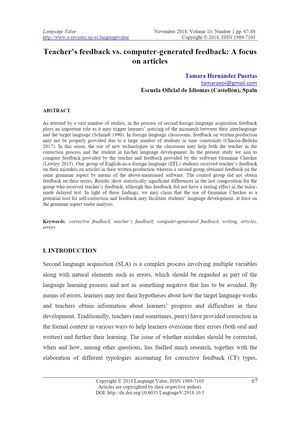
As attested by a vast number of studies, in the process of second/foreign language acquisition feedback plays an important role as it may trigger learners’ noticing of the mismatch between their interlanguage and the target language (Schmidt 1990). In foreign language classrooms, feedback on written production may not be properly provided due to a large number of students or time constraints (Chacón-Beltrán 2017). In this sense, the use of new technologies in the classroom may help both the teacher in the correction process and the student in his/her language development. In the present study we aim to compare feedback provided by the teacher and feedback provided by the software Grammar Checker (Lawley 2015). One group of English-as-a-foreign language (EFL) students received teacher’s feedback on their mistakes on articles in their written production whereas a second group obtained feedback on the same grammar aspect by means of the above-mentioned software. The control group did not obtain feedback on their errors. Results show statistically significant differences in the last composition for the group who received teacher’s feedback, although this feedback did not have a lasting effect in the tailor-made delayed test. In light of these findings, we may claim that the use of Grammar Checker as a potential tool for self-correction and feedback may facilitate students’ language development, at least on the grammar aspect under analysis.